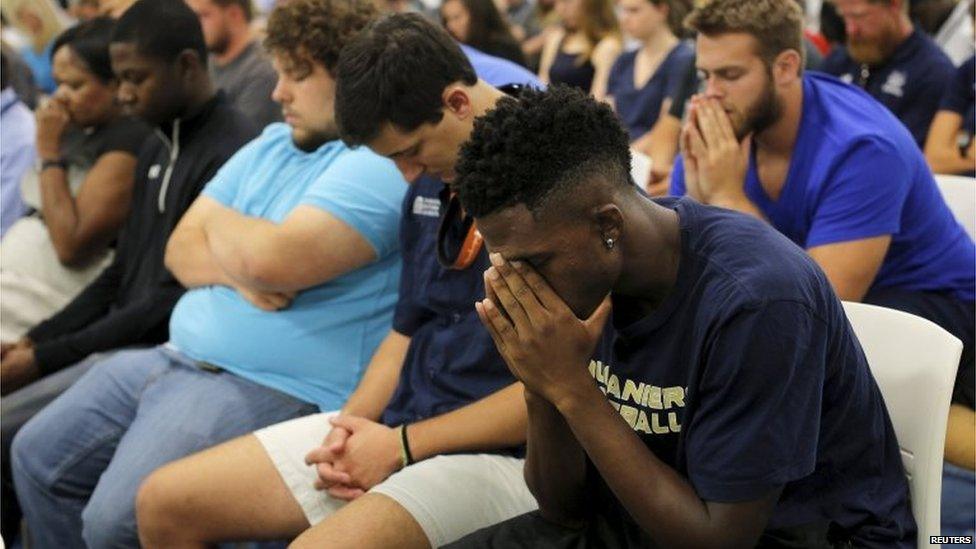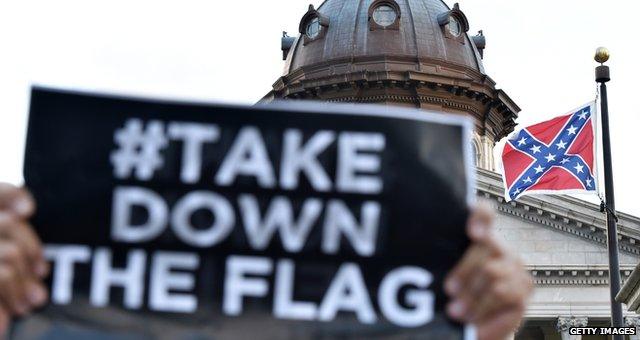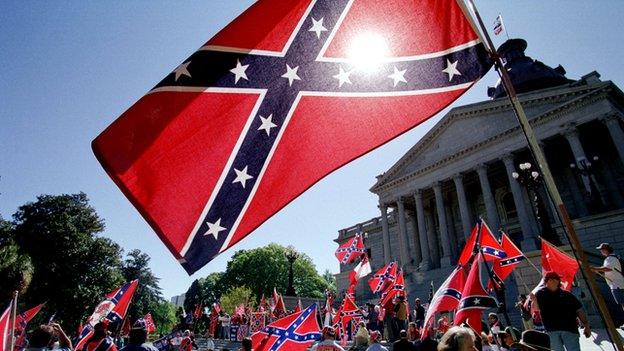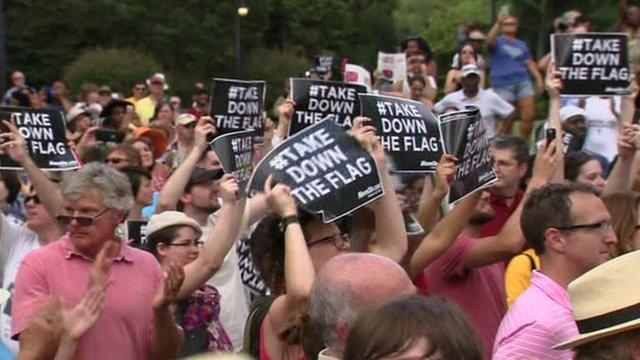Obama uses 'N-word' in interview about US race relations
- Published
Obama used the controversial term in a radio podcast
US President Barack Obama has used the "N-word" during an interview to argue that the United States has yet to overcome its issues with racism.
"Racism, we are not cured of it," the president said. "And it's not just a matter of it not being polite to say nigger in public."
The radio interview came days after a mass shooting in South Carolina which police believe was racially motivated.
Mr Obama will deliver a eulogy at the funeral of one of the men killed.
Clementa Pinckney, a personal friend of the president, was state senator and pastor of the Emanuel African Methodist Episcopal Church in Charleston where the attack took place.
In the interview, Mr Obama also lamented Congress' lack of will to enact stricter gun controls.
"It's not just a matter of overt discrimination," he told comedian Marc Maron in a podcast. "Societies don't, overnight, completely erase everything that happened 200 to 300 years prior."
The president acknowledged that attitudes about race in the US have improved since his childhood, but he said that America's history of enslaving black people "casts a long shadow and that's still part of our DNA that's passed on".
He has publicly used the N-word before but not as president. He used the word several times in his book Dreams from my Father.

Analysis - Nick Bryant, BBC News, New York
Though Obama is doubtless speaking about race with more passion, it could hardly be argued that he has cast caution aside.
His comments on the podcast, despite using such an explosive word, extend only a few sentences.
In the aftermath of Charleston, when speaking from the White House, his strongest comments were reserved for gun control rather than race.
Noticeably, he has yet to deliver a nationwide address on race akin to John F Kennedy's famed televised address in June 1963 or Lyndon Johnson's remarkable speech before a joint session of Congress in the aftermath of Selma.

Nine black worshippers were killed by a gunman during a bible study group at an African-American church.
The suspect, Dylann Roof, has been pictured holding the Confederate flag, a symbol used by southern states in the civil war when they tried to break away to prevent the abolition of slavery.

A remembrance service was held in the church where nine black worshippers were shot dead

Pressure is building to remove the Confederate flag from the South Carolina state capitol grounds
The shooting has restarted a debate over a Confederate flag that flies on the grounds of the South Carolina state capitol.
The National Association for the Advancement of Colored People (NAACP) and others have called for the flag to be removed, calling it a symbol of racism.

Birth of a flag
The flag seen today on houses, bumper stickers and T-shirts - sometimes accompanied by the words "If this shirt offends you, you need a history lesson" - is not, and never was, the official national flag of the Confederacy.
The design by William Porcher Miles, who chaired the flag committee, was rejected as the national flag in 1861, overlooked in favour of the Stars and Bars.
It was instead adopted as a square battle flag by the Army of Northern Virginia under General Lee, the greatest military force of the Confederacy.
It fast became a potent symbol of Confederate nationalism.

Mr Obama did not reference the flag in the interview, but he said on Friday that the flag belongs in a museum and should not be flown.
The shooting has also reignited debate over gun-control laws in the US.
In the same interview, Mr Obama lamented the influence that anti-gun-control lobbyists have on the US Congress, and how they prevented the enactment of stronger gun control legislation after the mass killing of school children in Newtown, Connecticut in 2012.
"The grip of the NRA on Congress is extremely strong," he said.
"I will tell you, right after Sandy Hook, Newtown, when 20 six-year-olds are gunned down, and Congress literally does nothing - yes, that's the closest I came to feeling disgusted," he said. "I was pretty disgusted."
- Published30 August 2013

- Published21 June 2015
